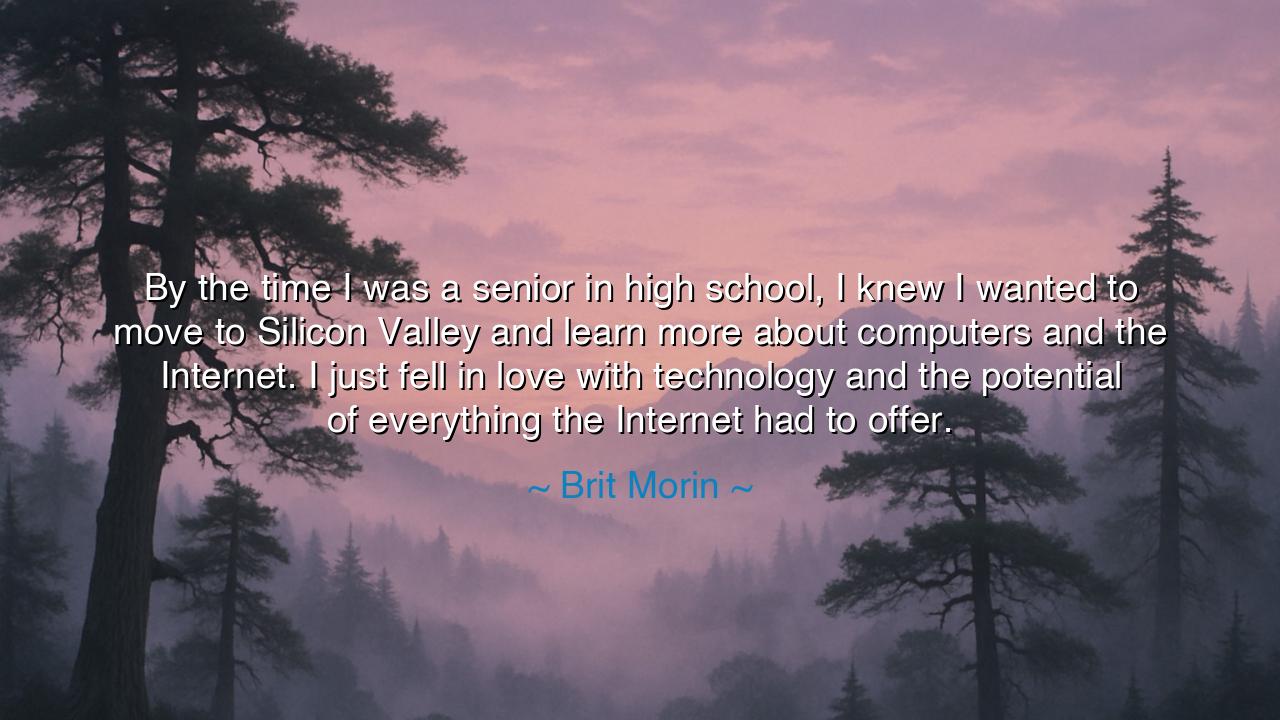
By the time I was a senior in high school, I knew I wanted to
By the time I was a senior in high school, I knew I wanted to move to Silicon Valley and learn more about computers and the Internet. I just fell in love with technology and the potential of everything the Internet had to offer.






The visionary entrepreneur Brit Morin, a creator who bridges art and technology, once said: “By the time I was a senior in high school, I knew I wanted to move to Silicon Valley and learn more about computers and the Internet. I just fell in love with technology and the potential of everything the Internet had to offer.” These words, radiant in their simplicity, carry within them the spark of a greater truth—that passion, when awakened, becomes a compass for destiny. In Morin’s reflection, we hear not merely the story of a young woman’s fascination with computers and the Internet, but the timeless call of the human spirit toward discovery, creation, and purpose.
In the age of the ancients, when young seekers felt the stirring of destiny, they journeyed toward the centers of knowledge—Athens for philosophy, Alexandria for wisdom, Chang’an for learning, and Nalanda for enlightenment. Brit Morin’s journey to Silicon Valley follows that same sacred pattern, for every era has its cradle of innovation, its gathering place for minds that shape the future. Where once the ancients built temples to Athena, goddess of wisdom, the modern world has raised towers of glass and light in which the new wisdom—technology—is forged. To move toward such a place, to dedicate one’s youth to learning and creating, is not an act of ambition alone but of devotion. It is to say: I will go where ideas are born, and I will add my voice to their chorus.
Her words, “I fell in love with technology,” reveal a truth that the wise have always known: that love is the beginning of mastery. No art, no craft, no science has ever yielded its secrets to those who approach it coldly. When one falls in love with an idea—with the potential of what it can become—then even the endless nights of study and failure become sacred. Morin did not love technology for its machines or screens, but for its promise—the way it could connect hearts, amplify creativity, and transform human life. In that, her love mirrors the fire that once burned in the minds of inventors and thinkers across the ages: the same flame that guided Da Vinci’s hands, Curie’s experiments, and Edison’s tireless pursuit of light.
The origin of her passion lies in a time when the Internet itself was still a frontier, vast and untamed. In the late twentieth and early twenty-first centuries, Silicon Valley had become the forge of a new civilization—where dreamers reshaped communication, commerce, and culture. Young visionaries, much like the philosophers of old, believed that knowledge and creativity could unite all of humankind. Brit Morin, like many who came before her, was seized by that vision. To her, the Internet was not a machine but a realm of infinite possibility—a living network through which imagination could flow freely. Her journey to this new Athens of technology was not merely geographical; it was spiritual, a pilgrimage toward the heart of the modern world’s wisdom.
There is an ancient parallel in the story of Hypatia of Alexandria, the mathematician and philosopher who, centuries ago, devoted her life to the pursuit of knowledge in a time when women were seldom allowed such freedom. Like Morin, Hypatia saw in the tools of her era—the astrolabe, the scroll, the geometry of the heavens—a way to expand human understanding. Both women, separated by millennia, share the same truth: that passion for learning transcends time, and that those who follow it become architects of the future. The tools may change—stone tablets give way to computers, the scroll to the Internet—but the spirit remains eternal.
Brit Morin’s declaration also carries within it a lesson for all who wander through the uncertainty of youth. She knew her path before the world had yet shown her the map. That certainty was not given to her by chance—it came from listening to the quiet pull of her own fascination. The ancients would have called this the daimon, the inner voice of purpose that guides the soul. Each person is born with such a voice, but few have the courage to follow it. When she says, “I knew I wanted to move to Silicon Valley,” she speaks of faith—the kind of faith that sees the seed before the harvest, the dawn before the sun has risen.
Let this be the lesson: follow your curiosity as others follow the stars. When you feel the spark of wonder—whether it be for art, science, or craft—nurture it as sacred. Learn with devotion; seek with courage; build with love. Do not wait for permission to pursue your passion, for the world belongs to those who move toward their dreams before they are recognized. As Brit Morin reminds us, the tools of creation—be they brushes, chisels, or computers—are only as powerful as the heart that wields them.
Thus, her words are not merely a memory but a call to action for every generation: to look upon the world not with apathy but with awe, not as spectators but as creators. The Internet, like the libraries of Alexandria or the forums of Athens, is a gift of boundless potential. To engage with it wisely, to shape it with compassion and vision, is to honor the lineage of all who sought knowledge before us. So, let her story remind us of this truth: when you fall in love with possibility, you become part of the endless story of human progress—and through your passion, you too can build the world that others will one day inherit.






AAdministratorAdministrator
Welcome, honored guests. Please leave a comment, we will respond soon